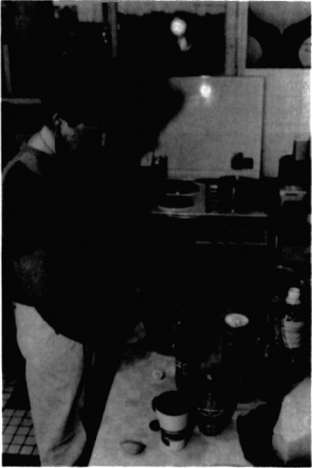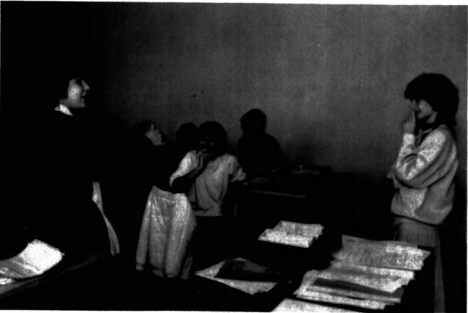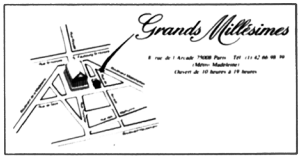2.2: Look at me.
- Page ID
- 142291
Questions et réponses, suite
B. Look at me.
Your instructor is going to give you a series of commands from the list below, not necessarily in the order followed here. He or she may ask you to repeat some of them, but for the moment we primarily want you to listen, understand, then comply with the "request." Your "réponse" in this exercise will be physical, not verbal.
| Regardez-moi. | Look at me. |
| (Jean-Paul), regarde ce stylo. | (John-Paul), look at that pen. |
| (Mlle F***), regardez ce livre! | (Miss F), look at this book! |
| (Fifi), donne-moi un stylo. | (Fifi), give me a pen. |
| (Jacques), rends-moi mon livre! | (Jim), give me back my book! |
| Levez-vous. | Get up. |
| (Philippe), lève-toi! | (Phillip), get up! |
| (M. G***), allez à la porte. | (Mr. G), go to the door. |
| Retournez à votre place. | Go back to your place (seat). |
| (Yves), retourne à ta place. | (Yves), go back to your seat. |
| Asseyez-vous. | Sit down. |
| (Mlle L***), ouvrez la porte. | (Miss L), open the door. |
| (Charles), ferme la porte. | (Charles), close the door. |
C. Am I looking at the door?
| —Est-ce que je regarde la porte? | teacher to student |
| —Oui, vous regardez la porte. | student to teacher |
| —Regardez la carte. | teacher to class |
| —Regarde la carte. | teacher to student A |
| —Tu regardes la carte? | teacher to student |
| —Oui, je regarde la carte. | student A to teacher |
| —Posez la même question à Mademoiselle C***. | teacher to student B; re: student C, f. |
| —Est-ce que tu regardes la carte? | student B to student C |
| —Oui, je regarde la carte. | |
| —Est-ce que vous regardez le mur? | teacher to group of students |
| —Oui, nous regardons le mur. | |
| —(Robert) regarde le mur? | teacher to student H, re: K |
| —Oui, il regarde le mur. | |
| —Est-ce que (Marie) et (Louise) regardent le mur? | |
| —Oui, elles regardent le mur. |
 Figure 2.4. Françoise prépare le diner.
Figure 2.4. Françoise prépare le diner.This question-answer exercise continues now with the verb toucher ("to touch"), as well as regarder, and the following nouns, which are introduced by sketches, gestures, or obvious context. Don't look them up unless you absolutely have to.
| une maison | un train | une école |
| une voiture | un lit | une chambre |
| un bureau | un café |
Grammar Notes: By the end of this exercise, you should have used all present indicative forms of the verb regarder, a regular verb of the "-er" conjugation (Verb Tables, page V-1, and see below). In addition, you've used the definite article (le, la, les). You'll have more work with the definite article in the Workbook and should read the Reference Grammar, 2.2.2 and 21.
 Figure 2.5. Elles se marrent?
Figure 2.5. Elles se marrent?
TROUVER, to find (CHERCHER, to look for; AIMER, to like, love)
| J'aime Susanne. | I love Susan. |
| Tu cherches un taxi. | You're looking for a taxi. |
| Il trouve le livre. | He finds the book. |
| Nous aimons le professeur. | We like the professor. |
| Vous regardez la photo. | You're looking at the photo. |
| Elles trouvent des cartes. | They find some maps. |
| Passé composé: j'ai trouvé, ... | |
| Imparfait: je regardais, ... | |
| Futur: je chercherai, ... | Futur proche: je vais aimer, ... |

